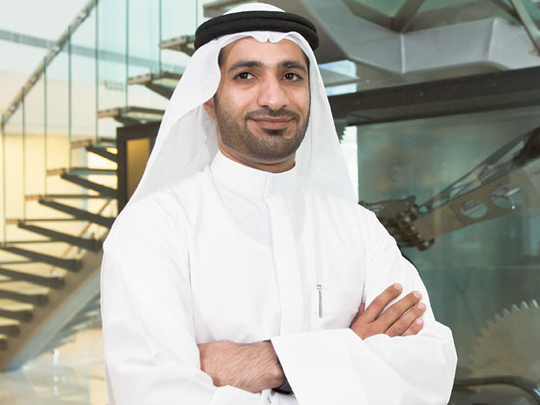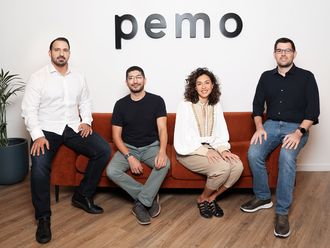
Dubai: The government must revisit company ownership laws that dictate a local partner with 51 per cent share if the UAE's industrial sector is to develop, Abdullah Bel Houl, managing director of Dubai Industrial City, told Gulf News.
Industrial factories make up just 20 per cent of the City since its launch in 2004. Gulf News sat down with Bel Houl to discuss how much DIC is playing a role in attracting investors to the UAE's industrial sector.
GULF NEWS: How many companies have registered at DIC so far in 2011 compared to 2010?
Abdullah Bel Houl: The total customers are approximately 500 investors today between 150 industrial companies and 350 industrial units. We recorded growth since last year, which we measure in terms of space. In 2010, we rented about 3.5 million square feet of warehouses. This month, we began renting with bookings reaching 40 per cent or four million square feet. For the industrial sector, we recorded one million square feet of growth in the industrial sector with food and beverages, chemicals and base metals being the main sectors.
We have a mix of international, regional and local companies. BSF is a German company that started this year, Al Marai is constructing a Dh60 million Logistics Centre which feeds the UAE market and there's the Kanoo Group. We recorded growth of about 15 per cent overall.
How do you see the state of the industrial property market at the moment and can it help stimulate the Dubai property market?
One hundred per cent, because industrial real estate is one of the best available, it is one of the least sectors with oversupply. An example of this is that eight investors in DIC have started constructing plants here because building costs are less today and there's a value proposition for this investment. The industrial sector was one of the least affected by the economic crisis and justifies itself for investments. Industrial property value has gone down but not at the same rate as residential and commercial.
What is the value of industrial investments in DIC now?
The value of infrastructure investments is Dh588 million. The total investments are about Dh600 million to Dh700 million. The income of DIC is 40 per cent from land, 40 per cent from warehouses and 20 per cent from offices.
The UAE is focusing on manufacturing to achieve economic diversification. How is DIC upping its game to attract industrial investors to Dubai?
DIC is one of the industrial areas with several benefits: The geographical location on the border of Dubai and Abu Dhabi, close to Jebel Ali Port and Al Maktoum Airport, so there's accessibility to all the emirates and the neighbouring countries. DIC has complete solutions from industrial lands, warehouses, storage, labour accommodation and offices. You only deal with one entity for your industrial needs. We have a government support centre that helps investors set up and register their companies, finish paperwork with government entities such as Dubai Municipality and Civil Defence. The centre employees move in between investors and the government.
What are your expectations for the industrial sector in 2012 and where is it heading?
The industrial sector contribution to the GDP is 15 per cent and the government is targeting 25 per cent in the next few years. The aim is to grow this industry. There is demand for industrial land, especially in the last four months and international companies are looking at the opportunities in the UAE. Nothing has materialised but there are inquiries. There are negotiations for four to five million feet of industrial land worth Dh12 to Dh13 million for leasing. Why Dubai? Due to the political situation in the Arab world, these investments that were poured there are now directed to the UAE because of security and stability. But these are individual cases we saw.
What are your expectations for the industrial sector's growth next year and will it be on track to achieve this target?
With all these government initiatives, I expect that we can reach this target but with an encouraging environment.
What initiatives are needed to persuade investors to pour their money in the industrial sector, given the longer return on investments compared to other countries?
We expect that financial institutions in the next few years will look at the industrial sector as a driver of the economy and a priority for funding. There's also the Emirates Industrial Bank. But you can't depend on the government 100 per cent, there has to be a partnership between private financial institutions and the government. I expect the industry to grow about 13 per cent and the same for DIC, based on inquiries in the market, negotiations with investors and good potential in the market especially growing sectors like Food and Beverages. It is important and fast-growing.
Return on industrial investments is slower than other sectors and some businesspeople who are expats have a shorter sense of continuity here. What are you doing to attract investors to the industrial sector for the long term?
This is not our target investor because he does not have a long-term investment. If he wants to make a quick buck, what are his choices? Either real estate or services. Are these sectors recording growth today in UAE or not? That's the question. So if you want sustainable revenue, I think the industrial sector is the best one. Where do you have population growth? Middle East and South Asia compared to Europe and America. It is natural to see investments migrate here because of a growing population that needs food, drink, personal care, etc. As long as there is opportunity for growth, I think investors will be attached to the industrial sector.
In terms of the regulatory environment, what amendments or new laws are needed to develop the industry further?
The intellectual property law needs to be revisited to help attract international players in the region. There needs to be enough protection for industrialists, their products and ideas. In the industrial sector, one condition is that there must be a local or Gulf partner and this is one of the challenges we face in attracting international companies.
What are the comparative cost-savings of setting up in Dubai Industrial City?
I expect it's about ten to 15 per cent. You save on indirect costs or operation costs. We did it a study that showed transportation costs in any industrial project make up 30 to 40 per cent of operation costs. If you're close to raw materials in Jebel Ali ports, the emirates and GCC and highways across the UAE, then you save in operation costs.
Dubai Industrial City has been seen as merely a location for warehousing and labour accommodation as opposed to a major industrial base. Where is the real industrial output here and how do you respond to this criticism?
For example, you have Eurofood factory that makes pancakes and frozen croissants. There's Perfect Food that makes meat and fast foods, Barakat Juices. The industrial factories make up about 20 per cent of the City. Compared with the lifespan of the City, this is considered excellent. The City is seven years old, it launched in 2004.
Massive construction of warehousing and accommodation began at the City during the boom, but the industrial growth was not parallel to that.
Wasn't that the original mandate of the City? The warehouse and accommodation is a supporting product to the main product which is selling industrial land. But to have a factory you need accommodation for your workers, you need a warehouse for your finished products. So you can't expect the factories to grow in parallel with this. We made the infrastructure and the factories are growing day by day. We are creating a base for the industry. Then you can build around it. When you talk about warehouses, it's not just for storage, some are used for medium to light manufacturing. Don't forget there's been a couple of years of economic crisis.
You mentioned a 20 per cent presence of industrial companies in the City over seven years. This is not a very quick rate.
Industrial growth is always gradual, so then you create a base for manufacturing. This year we had three factories opening and five or six that started construction.
What is the demand for industrial investment like in the City and is it living up to its mandate?
We attract key players from key sectors then let them build around it. It's building a supply chain. If there is one main player, like a personal care company, then you get packaging, printing, shipping. You create that environment and that synergy across the City.
Are there any funding opportunities that you facilitate between the investors and financial institutions?
At the end, it's a direct relationship between the investor and the banks but we do network with the banks. We tell them about the City, infrastructure, and give them the comfort to fund projects in the City. They have funded three to four projects in the past three years.
Are investors still having problems finding funding?
No, not in the last year. Financial institutions are made for businesses with honest people. Since the real estate sector was affected heavily and other related sectors were impacted by real estate, where will they direct their money? The industrial sector. Our investors signed funding agreements and it was much easier than last year because liquidity is available.
Khalifa Industrial Zone Abu Dhabi (Kizad) has a similar mandate as Dubai Industrial City and they are opening in Abu Dhabi next year. How will you be competing with that?
Both of us complement each other. Kizad has the front market proposition and it is a free zone we are non-free zone. How are we going to compete? It's still not clear. Kizad hasn't entered the operation phase. From a competition perspective, still they are in the planning phase, they're not yet into operations stage where Dubai Industrial City is ahead, we have infrastructure, we are operating and ready to receive investors.
What are some of the roadbumps ahead for the industrial sector?
Relatively we are a small country with a small population compared to other GCC countries. To put up your industry base, you need to create a bigger consumer base and market. But considering the geographical location of the UAE, this is helping us to be an exporter. About 75 per cent of our production will be for export.
What is your vision for the City in the next few years?
Our target is to create an industrial base by attracting major strategic business partners for each zone, to create synergy between them.
Since we completed our development stage: 36,000 beds for labourers, seven million warehousing, Dh558 million in infrastructure to attract the tenants by targeting growth of ten per cent every year. We moved from construction to operation.












